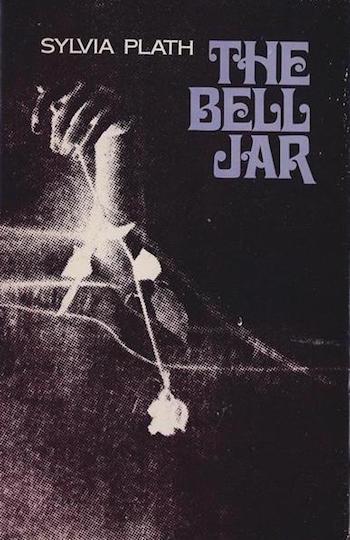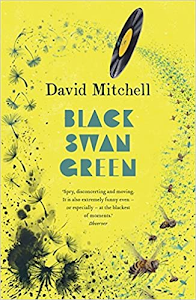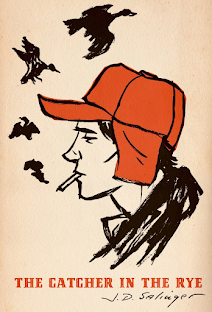Suburbia as Dystopia
In Sylvia Plath's The Bell Jar, suburbia represents failure. To Esther Greenwood, it's the ending of everything she's ever wanted, and essentially her greatest fear. It represents what she spends hours contemplating, the end of her life as she knows it, the thing which repulses her to an unimaginable degree: settling down and becoming a mother. In the beginning of the book, Esther is not at all interested in settling for anything. Even though her career is taxing and makes her unhappy, it's far better than getting married and starting to have babies with someone like Buddy Willard. Esther doesn't understand Doreen's obsession with relationships, and is completely horrified when Buddy takes her to his hospital and she witnesses a birth. The idea of motherhood is one she can neither fathom nor stomach, especially in the context of how drastically it would change her life.


Esther is repulsed by the idea of ever being married. In the beginning of the book, she is deeply unsettled by the gendered expectations that accompany relationships and marriage. When Buddy admits that he had slept with another woman while they were sort of going out, she questions why she couldn't be allowed the same freedoms as he is. The idea of Buddy overall disgusts Esther — from their first "romantic" encounter to his sleazy marriage proposal at the tuberculosis sanitarium, she wants nothing to do with anything Buddy Willard has to offer for her future self: marriage, having kids, moving in together, and sharing a life. Especially because, after witnessing the birth at the hospital, Esther thinks that birth is unnatural, something women are convinced to do by men (and heavily drugged, so they never remember the pain). All of these aspects of settling down are terrifying to her, which is why suburbia is such a revolting place.
Living in the suburbs represents absolutely everything that Esther hates. Living in the suburbs means you've settled down, found a husband, starting popping out babies, and quit your job to become a full-time mother. Living in the suburbs means that you lose your freedom, and are reduced to a caricature, like Dodo Conway. Esther broke away from the dull life that was laid out neatly for her by going to New York for more schooling, moving away from her family and "perfect" boyfriend to pursue what she wanted, instead of jumping to the next stepping stone she was expected to. However, once she left New York, she was right back on her old, familiar, horrifying path. It's enough pressure to have a life laid out for you, but Esther is so unable to picture living the life she's expected to lead that she is ready to die to avoid it. Returning to her suburban home shows Esther that everything she worked towards, her career and her dreams, got her nowhere. Considering how much Esther went through in New York to try to protect her dream, even when she hated living through it, having all that effort be for nothing is a devastating blow. In suburbia, she is cut off from all other possibilities and trapped in the suffocating bell jar that is society's expectations for what she is to do with her life.


Hello, the suburbs absolutely represents failure. Especially with the heavy and oppressive gender roles at the time being a married woman in the suburbs at the time did not have a lot of variance in experience. None of what Esther wants out of life coincides with the suburbs. Dodo is so scary to her because she embodies everything about the suburbs. Great post!
ReplyDeleteIt is absolutely true that the suburbs represent failure for Esther. I think that her fear of the suburbs heavily sets in when she sees Dodo Conway and her entourage of kids. Esther has much bigger dreams than ending up as a married woman constantly producing babies, and her dream slowly starts fading away when she doesn't get into the writing program and has to stay with her mom. The suburbs also worsened her mental condition by displaying what she was afraid of right outside her front door. I think going to the mental hospital and getting away from suburban life, along with Dr. Nolan's treatment, massively helped Esther feel better about herself.
ReplyDeleteI really like your thesis that the suburbs' characteristics represent the things which Esther most hates. It reminds me of Holden Caulfield and his rejection of "phoniness:" both seem to be a rejection of the traditional notions of an American life with all the trappings of mundanity.
ReplyDeleteI really like the point about how despite Esther's efforts to flee from the suburbs and what they represent she still inevitably returns to them and what they represent. The way that the suburb pulls her back towards this conformity really makes it clear how Esther breaks down when she is confronted with this seeming inevitability.
ReplyDeleteI think its true that for Esther the suburbs represent failure. We get the idea that the idea of settling down and having a kid isn't great for her. But in the very beginning where she doesn't get into her program she has to spend the whole summer in the suburbs. From the start, the area represented failure to her.
ReplyDeleteIts totally true that Esther hates the suburbs, and the ideals of motherhood and settling down. It would be interesting to read a second part of Esthers Story after the Bell Jar, when she can find herself and somewhere she can settle down without having to hate it like the suburbs.
ReplyDeleteI agree with your post completely. Suburbs as a whole represent all of the expectations that Esther despises summed up into one community. The criticisms and fears Esther has of the suburbs reminded me a lot of the criticisms of suburbs that we encountered in US History last year, like the song "Little Boxes."
ReplyDelete